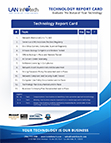What seems like a rather innocent gesture — getting your device fully charged in public — can result in the malicious theft of your data. If you choose to charge your device in public, know that it comes with some risk.
Why Are Public Charging Ports Risky?
“Plugging into a public USB port is kind of like finding a toothbrush on the side of the road and deciding to stick it in your mouth. You have no idea where that thing has been,” said Caleb Barlow, a vice president with IBM Security, in a recent Forbes article.
While the risk may be small, the challenge is that the USB ports we all use for charging devices can be used to transmit data. It’s the same technology that allows you to plug your phone into a desktop or laptop hack and transfer photos, files and other information, update an operating system or back up your mobile device’s content. The power recharging and data transfer functions use the same cable connected to your device to operate.
Most charging USB ports will not attempt to access or take information off your device, but the technology is there.
What Is Juice Jacking?
‘Juice jacking’ is an attack that takes advantage of the charging/data technology. In some cases, a jacked outlet could be connected to a concealed device that downloads photos, videos and contacts. At its worse, a juice jacking attack could install malicious code on your device that’s designed to compromise functionality, overwrite data or steal sensitive information.
The concerns about public charging outlets are in the same category as using public Wi-Fi networks, especially on devices that contain sensitive business information and apps. These networks are common in airports, planes, malls, coffee shops, hospitals and even parks.
What Can Hackers Access from a Public Charging Port?
What can be accessed largely depends on the way your device is hacked and how good the hacker is. It’s possible that a hacker could access more than your contacts. Emails, personal and business data and passwords are all vulnerable. Hackers could also look at and record everything you visit and use.
How Can I Protect Myself and My Employees?
Businesses can stay protected by making sure that they have clear policies about what employees can access, what types of networks should be used and what to avoid in public places. Other options include using portable USB charging packs, USB cords designed only for charging that cannot transmit data or add-ons to your USB cord that block data transmission.
At LAN Infotech, we help businesses keep devices, data and systems protected. To learn more about how to keep your employees and information safe, schedule a free, no-obligation initial consultation today.

LAN Infotech is a Microsoft Cloud Services Provider, IT Managed Support company and a leader in helping law firms, nonprofits and medical organizations deploy cloud solutions, manage computer networks, keep data protected and top technology management company. Businesses like yours need technology support to run highly-effective organizations.


